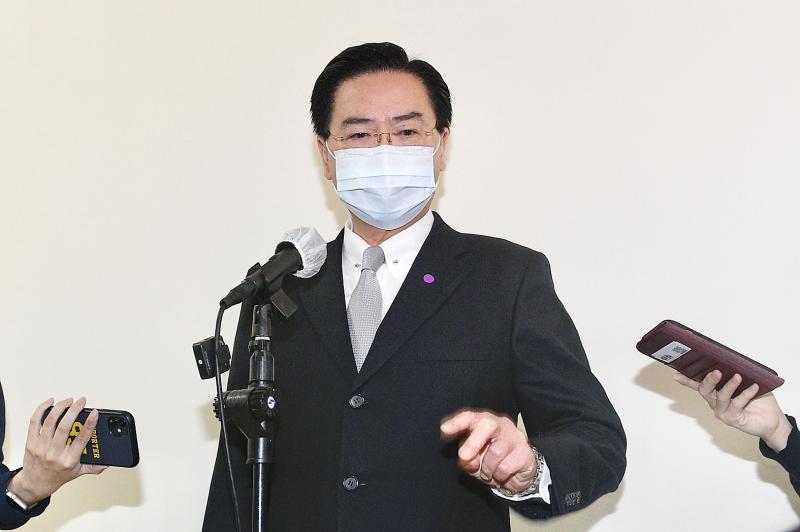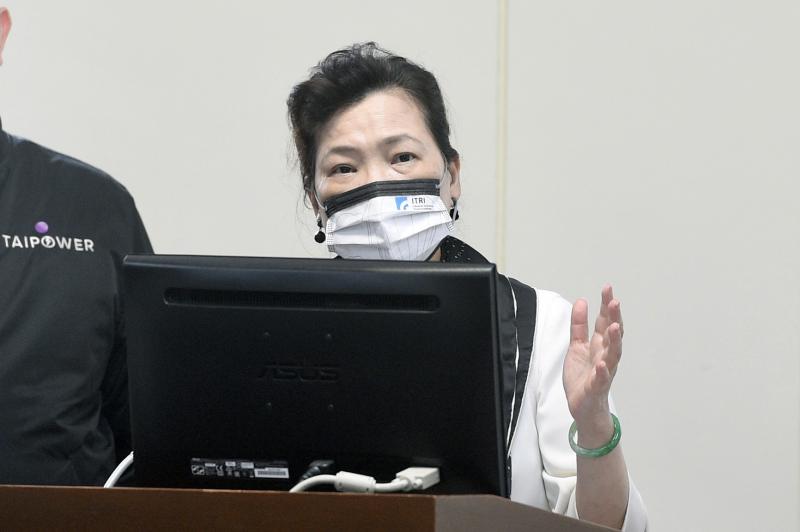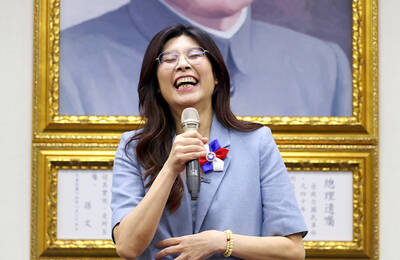Two of the nation’s top trade negotiators yesterday hinted at the possibility of Taiwan being included in the US’ Indo-Pacific Economic Framework, which is expected to be announced later this month.
Speaking at a question-and-answer session in the legislature, Deputy Minister of Economic Affairs Chen Chern-chyi (陳正祺) and Assistant Trade Representative Benjamin Hsu (徐崇欽), who handles US-related issues, said there “is a chance” Taiwan would be included in the new framework.
Minister of Foreign Affairs Joseph Wu (吳釗燮) agreed, saying that Taiwan “would theoretically be included” in the framework, although the level and manner are still being worked out.

Photo: George Tsorng, Taipei Times
US lawmakers, think tanks and industry groups have all been outspoken in their belief that Taiwan should be included, while Washington has never explicitly denied Taiwan an invitation, Wu added, citing assurance from US Secretary of State Antony Blinken that the US is not “closing the door on anyone, including Taiwan.”
Deputy Minister of Foreign Affairs Tien Chung-kwang (田中光) said the framework is different from a trade pact in that it would not involve tariffs or market access.
It instead centers around four pillars: fair and resilient trade; supply chain resilience; infrastructure and decarbonization; and taxation and anti-corruption, Tien said.

Photo: George Tsorng, Taipei Times
Signatories would likely not be expected to sign onto every pillar, he added.
However, Chen was less optimistic about the chance of signing a bilateral trade agreement with the US soon, saying there is “no way of estimating a timetable.”
“Looking at the conditions, I am afraid it will take some time,” he said, referencing a lack of consensus within the US.
As the US Congress has not yet renewed the Trade Promotion Authority, the US trade representative is not authorized to restart bilateral trade agreement negotiations, said Douglas Hsu (徐佑典), director-general of the Ministry of Foreign Affairs’ Department of North American Affairs.
Former US president Donald Trump was willing to sign bilateral trade deals, but was primarily interested in China, while US President Joe Biden is interested in cooperating with US partners, but is more reserved when it comes to trade agreements, making it difficult to estimate when a deal might materialize, Chen said.
However, judging from the US’ recent substantive cooperation with Taiwan, Chen said that things are “moving in the right direction.”
Meanwhile, Minister of Economic Affairs Wang Mei-hua (王美花) yesterday touted the benefits of teaming up with Taiwan’s semiconductor manufacturers in response to a report of growing cooperation between the US and Japan.
A Nikkei Asia report on Monday said that Japan and the US would deepen cooperation on building supply chains for advanced semiconductors, amid the growing rivalry between the US and China.
The Japanese media outlet said it had learned that the two governments were close to agreeing to cooperate on producing chips more advanced than 2 nanometers.
Japanese Minister of Economy, Trade and Industry Koichi Hagiuda, who is visiting the US, is scheduled to meet US Secretary of Commerce Gina Raimondo. They are expected to announce the chip cooperation during Hagiuda’s visit, Nikkei Asia said.
Based on the discussions from a recent industry forum cohosted by the ministry and the American Institute in Taiwan, “the most efficient and best way” to build global supply chains for semiconductors is through cooperation with Taiwan’s industry, Wang said.
“Taiwan is very confident about this,” she said in an interview outside a meeting of the legislature’s Economics Committee.

The combined effect of the monsoon, the outer rim of Typhoon Fengshen and a low-pressure system is expected to bring significant rainfall this week to various parts of the nation, the Central Weather Administration (CWA) said. The heaviest rain is expected to occur today and tomorrow, with torrential rain expected in Keelung’s north coast, Yilan and the mountainous regions of Taipei and New Taipei City, the CWA said. Rivers could rise rapidly, and residents should stay away from riverbanks and avoid going to the mountains or engaging in water activities, it said. Scattered showers are expected today in central and

COOPERATION: Taiwan is aligning closely with US strategic objectives on various matters, including China’s rare earths restrictions, the Ministry of Foreign Affairs said Taiwan could deal with China’s tightened export controls on rare earth metals by turning to “urban mining,” a researcher said yesterday. Rare earth metals, which are used in semiconductors and other electronic components, could be recovered from industrial or electronic waste to reduce reliance on imports, National Cheng Kung University Department of Resources Engineering professor Lee Cheng-han (李政翰) said. Despite their name, rare earth elements are not actually rare — their abundance in the Earth’s crust is relatively high, but they are dispersed, making extraction and refining energy-intensive and environmentally damaging, he said, adding that many countries have opted to

SUPPLY CHAIN: Taiwan’s advantages in the drone industry include rapid production capacity that is independent of Chinese-made parts, the economic ministry said The Executive Yuan yesterday approved plans to invest NT$44.2 billion (US$1.44 billion) into domestic production of uncrewed aerial vehicles over the next six years, bringing Taiwan’s output value to more than NT$40 billion by 2030 and making the nation Asia’s democratic hub for the drone supply chain. The proposed budget has NT$33.8 billion in new allocations and NT$10.43 billion in existing funds, the Ministry of Economic Affairs said. Under the new development program, the public sector would purchase nearly 100,000 drones, of which 50,898 would be for civil and government use, while 48,750 would be for national defense, it said. The Ministry of

UNITED: The other candidates congratulated Cheng on her win, saying they hoped the new chair could bring the party to victory in the elections next year and in 2028 Former Chinese Nationalist Party (KMT) lawmaker Cheng Li-wun (鄭麗文) yesterday won the party’s chair election with 65,122 votes, or 50.15 percent of the votes. It was the first time Cheng, 55, ran for the top KMT post, and she is the second woman to hold the post of chair, following Hung Hsiu-chu (洪秀柱), who served from 2016 to 2017. Cheng is to succeed incumbent Eric Chu (朱立倫) on Nov. 1 for a four-year term. Cheng said she has spoken with the other five candidates and pledged to maintain party unity, adding that the party would aim to win the elections next year and